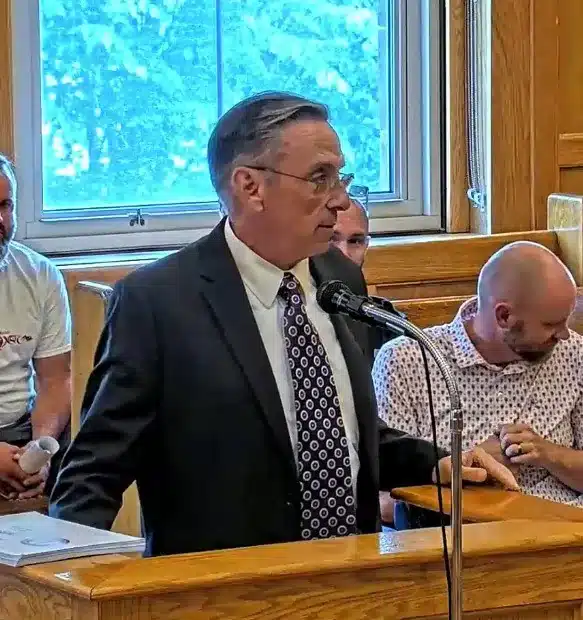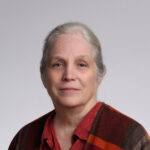Westfield Mayor Michael McCabe presented the FY26 budget to the City Council on June 6.
Photo credit: Westfield Community TV
WESTFIELD — The final vote by the City Council to approve the fiscal year 2026 budget took only a few minutes out of the special meeting hosted in the Westfield Senior Center on June 30.
The brevity of the meeting belied the months of budget work by Mayor Michael McCabe, department reviews by the Finance Committee, and a public hearing and budget reconciliation meeting by the council the previous week.
Ralph Figy, as chair of Finance, made the motion to pass the budget as presented. “I think we had a good process this year,” he said, calling it “jam-packed.” He thanked all of the councilors for their input along the way.
Finance member Richard Sullivan, who had asked Figy to entertain several cuts at the reconciliation meeting while he was out of town, said since the cuts did not pass the council, he would be voting for the budget. The cuts Sullivan recommended were mostly in public works and engineering, and councilors said they felt with a new DPW director beginning in a couple of weeks, they didn’t want to “hamstring” him.
The budget passed on a vote of 10-1, with Councilor Kristen Mello the sole no vote. Councilors Nicholas Morganelli and William Onyski were not present at the meeting.
After the vote, the council unanimously approved an appropriation of $2 million from free cash to the fund balance reserve to reduce the FY26 tax. Figy explained that the free cash was already incorporated into the budget. “This is formalizing and approving it so it can be part of the budget,” he said.
Westfield Auditor Vicki Moro then submitted the FY26 Order of Appropriations by department for a final vote by the City Council, which also passed 10-1, with Mello dissenting.
After the meeting, Moro said the final general fund budget breaks down as follows: city, $88.27 million and school, $75.57 million for a total of $163.84 million.
Moro said the increase in taxes is approximately 6.5% including a Proposition 2 1/2 2.5% increase for FY26 and 4% increase use of the excess levy capacity. She said the increase for each household will vary depending on the valuation of their property.
Following the meeting, McCabe said the budget process began in January with Moro and with department heads presenting their fact-finding budgets beginning the first week in February, which he said starts the process of meeting with each individual department head through March, sometimes three or four times.
McCabe said this was his fourth budget, and the problems the city faced were from large unexpected expenses, Proposition 2 1/2’s 2.5% cap of approximately $2.2 million and no new growth. He said all put together, the “asks” were $17 million over last year’s asks.
McCabe said even after adjustments were made, including increasing the DPW trash fee to cover costs, bringing in $2 million, the city still had a shortfall of $4 million to maintain city services. He said that meant the city had to go into the excess levy capacity that he said was “created by not fully taxing folks over the years.”
“Excess capacity is created by taxing less than 2.5% year over year. Last year, taxes were negative 1% – in essence, we lost 3.2 million in revenue,” McCabe said.
“If we’re allowed and should tax at 2.5% to keep up with inflation, and instead tax negative one, the change is 3.5% — $3.2 million of money that now gets into the levy capacity because it wasn’t charged. The state says don’t come to us looking for money if you’re not charging your rate,” he added.
He noted for homeowners who pay $6,000 annually in taxes, a 6.5% increase will be approximately an additional $360 a year.
McCabe said the two biggest budget busters for the city this year were health insurance, which increased by $4.6 million, and school transportation, which increased by $1.5 million.
“By next year, we will have caught up some,” he said, adding that his goal is to not use free cash in budgeting anymore, which he said feels good, but is harmful in the long run.
“We used $5 million (free cash) in the FY25 budget,” which he called an artificially created revenue stream to meet expenses. He said that is not the best way; instead the city needs to tax appropriately and attract new growth, which he agreed comes with its own set of environmental challenges.
“We just did what needed to be done to try and continue services at the current level for the citizens of Westfield. This was the hardest budget that I have had to deal with during my time on the council,” said Figy after the meeting.


